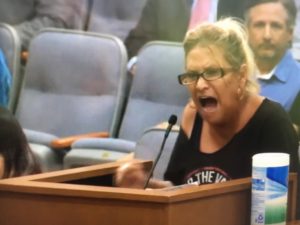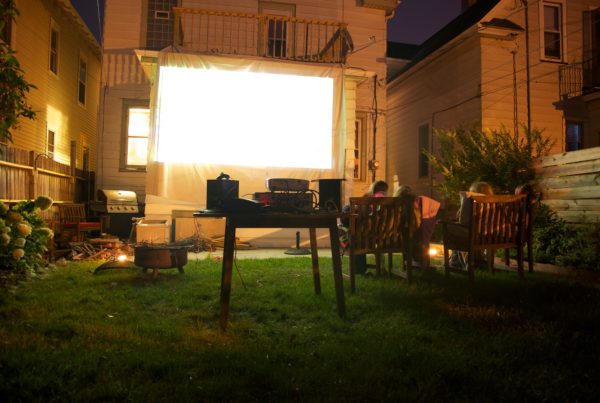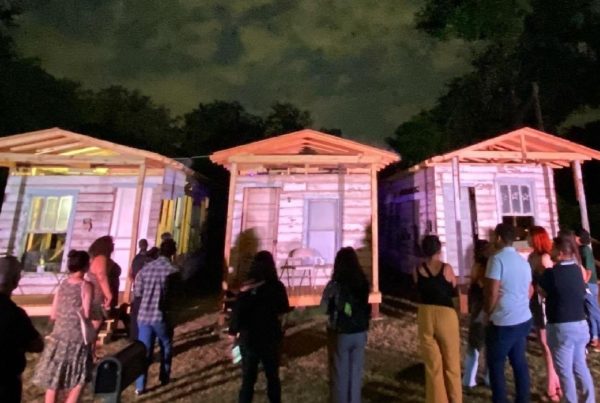From KERA:
At the last Fort Worth Independent School District board meeting on June 22, chants of “USA, USA” and other phrases occasionally interrupted business.
Nearly 100 speakers showed up, many to blast the district for what they deemed an invasion of critical race theory, or CRT into the curriculum.
“I’ve seen critical racist theory enter the school,” speaker Kathryn Pompa said. “CRT is reformulated Marxism, a neo-racist world view that exists to agitate, enable radical identity politics, divide people.”
“This cultural ideology is not a solution to unity but a tool for bondage, destruction, and further separation and clearly, the enemy of our day,” added Janna Clark.

Blanca Martinez tells Fort Worth ISD school board members that Critical Race Theory is evil. “It’s a poison to the mind. It corrupts,” she said.
Bill Zeeble / KERA News
Blanca Martinez pounded her fist on the lectern and yelled “CRT is a poison. It’s a poison to the mind. It corrupts!”
Trustees listened quietly.
The Fort Worth school district says it does not teach CRT and never has.
In Texas and across the country, critical race theory has become a political lightning rod. Many Republican-led states are working to ban the school of thought from classrooms — even though teachers say they don’t even teach it.
This spring, Texas passed two laws taking aim at CRT. Republican Gov.Greg Abbott didn’t think they went far enough, so he included CRT on the agenda for the special legislative session that started this week.
Educators say most people, including critics, don’t even know what is.
What Is Critical Race Theory?
Nikki Jones teaches African American studies at the University of California, Berkeley. Jones described CRT as a way to understand how race influenced the historical laws of this country — laws that justified everything from slavery to violence.
“It’s a way to see race,” Jones said. “To see understandings of race, to see racism, in places where it may not otherwise on the surface of it be apparent.”
CRT is a decades-old intellectual movement born out of law schools that teaches that racism is embedded in systems and structures in the U.S. — such as legal institutions — rather than just being the product of individual prejudice. It is taught in some law schools and universities, but there’s little evidence children and teens are learning the concept in grades K-12.
One of the Texas laws targeting CRT is House Bill 3979. Houston-area Rep. Steve Toth (R-The Woodlands) says he wrote it to help children.
“Kids are being scapegoated,” Toth said. “We’re seeing critical race theory popping up all over schools.”
Toth’s bill takes on CRT without ever naming it. He said students are being “indoctrinated,” describing a situation a constituent from Highland Park, a high-income, predominantly white enclave surrounded by Dallas, shared with him.
“A parent in Highland Park sent me a copy of the book that her 8-year-old son was asked to read. “It’s called ‘Not My Idea: A Story About Whiteness,'” Toth said. “I thought that the whole idea of stereotyping, racial profiling was a bad thing, and critical race theory goes into profiling white people. They’re being taught that crap now in school.”
Highland Park says that’s not true. The school district said 82% of its students are white and less than 1% are Black. Spokesperson Jon Dahlander said the district can’t even find the book Toth mentioned.
“We don’t have the book in any of our school library catalogs,” Dahlander said. “Nor have we been able to find it on any of our campuses.”
Dahlander also said that Highland Park does not teach critical race theory.
“Period. End of story,” Dahlander ephasized.
A Political Battle
Toth’s bill tells history teachers how to teach complex subjects that include explaining racism.
“You can’t teach that one race is better than the other. You can’t teach that one gender is better than the other. You can’t discriminate and say that one race or one gender is responsible for the ills of the past,” Toth said. “We need to teach about the ills, but you can’t blame this generation for those things of the past.”
State Sen. Royce West (D-Dallas) says history should be taught equitably and truthfully.
“There were instances in this country, where even in the articles of secession in 1861, it was said that the Caucasian race is superior to the African American race. That’s history,” West said. “I think that it would be totally unfair if you said you can’t teach what history has shown us to be the position in the past.”
Senator Nathan Johnson represents Highland Park. He said he sees no need for Toth’s bill because CRT isn’t taught in any Texas school district — no matter what others believe.
“It’s not uncommon for people to genuinely believe things that aren’t true, particularly when their political leaders tell them they’re true,” Johnson said. “This is a political stunt.”
Gov. Abbott is up for reelection next year, and faces at least two primary opponents further to his right. By doubling down against CRT in the special session, he’s joining conservatives across the country in vilifying a curriculum that the majority of K-12 educators in Texas say does not exist.
UC-Berkeley’s Jones says with this legislation, Texas has fallen in line with other states where legislators passed laws that legitimize fear.
“It is not, in fact, true that critical race theory is racist,” Jones said. “It is not, in fact, true that it encourages people to hate this country.”
At the Fort Worth school board meeting, some people who like what the district’s doing also spoke out.
Fort Worth ISD has created a racial equity plan. Those who defend it say critics are confusing it with CRT.
“critical race theory is being taught to kids about as often as we teach physics to second graders. Children are not being indoctrinated to hate themselves or anyone else,” speaker Kent Bradshaw said. “Save that fight for when your kid goes to law school. That’s where they teach CRT.”
Kimberly Williams said she worries how this push will discourage teachers from directly talking racial injustice, and what that could mean for the future.
“As an African American female educator, we know that when racial equity is not consciously addressed, racial inequality is often unconsciously replicated,” Williams said.
Audience cheers followed her words.
Got a tip? Email Reporter Bill Zeeble at bzeeble@kera.org. You can follow him on Twitter @bzeeble.













